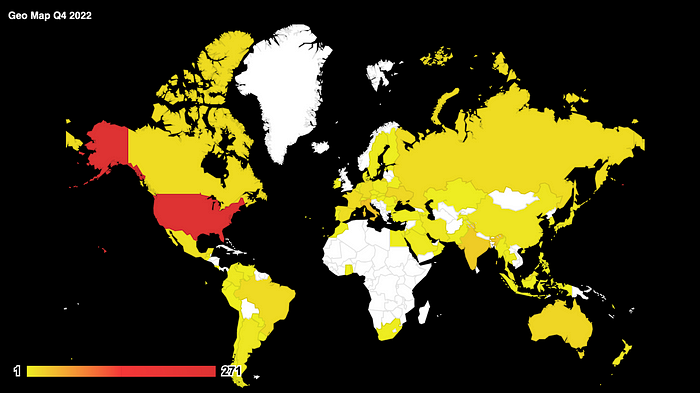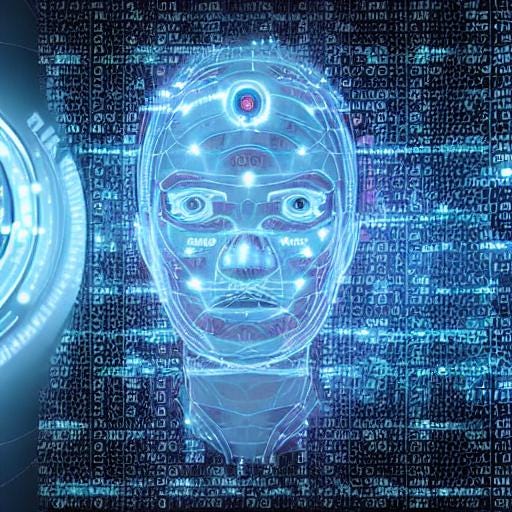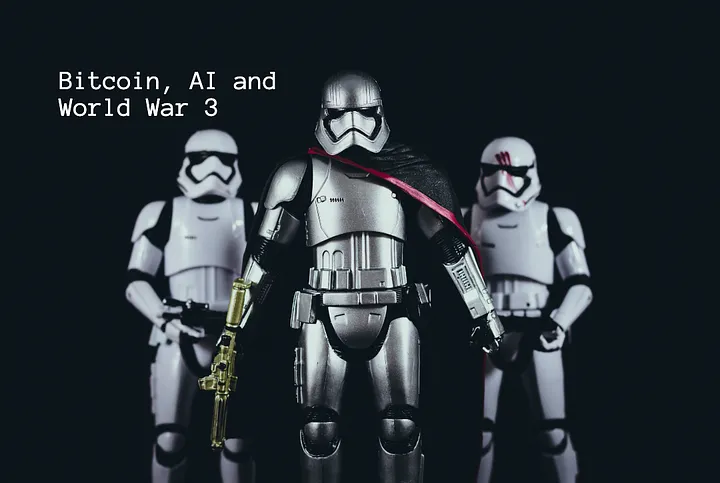The warfare revolution
What’s the first image that comes to mind when you think about the idea of global conflict, like a world war?
Do you imagine tanks and planes and bombs dropping all around? Do you imagine nuclear strikes? Massive air and land campaigns?
I think most people picture things like that. Do you think it might be possible for war to look different?
There is an old saying that says, “Armies spend the peace learning to fight the last war.” The Maginot Line, built in post-WWI France, serves as a shining example of the failure of that kind of thinking.
Like all human activity, war changes with technology. Tactics change with technology. People improvise. People adapt.
For us Americans, Iraq serves as our shining example of the failure to understand and comprehend what kinetic warfare looks like modernly.
When we went to topple Saddam Hussein in ‘03, Iraq still had a formidable standing military. They had tanks, planes, air defenses, special forces, etc.
The US military had better stuff. Way better stuff. They rolled into Iraq with almost no legitimate military resistance.
Eight years later, with thousands of American dead, tens of thousands Americans maimed, and tens to hundreds of thousands of Iraqi dead, America left the country in defeat.
The most powerful military force on earth lost wars in Iraq and Afghanistan. Neither is an economic or military powerhouse. Afghanistan has quite literally been bombed back to the stone age.
Yet, we lost. How?
Because the American military, still to this day, is prepared to fight another WWII. Problem is, there are no military peers to fight that way with.
China is a “near” peer, as is Russia.
But, that’s about it. The trouble with fighting even a near peer is the niggling little problem of mutual assured destruction.
As it stands right now, when military leaders game out full scale combat scenarios against China over Taiwan, there is no clear winner. Worse yet, there are very plausible scenarios where we lose.
Badly.
Which is why it probably won’t happen. Just like a kinetic WWIII didn’t happen when the Soviets were the threat of the day back in the 80s.
But, what if that’s not what war among peers looks like anymore? And, if that’s true, what if we aren’t even correctly identifying our peers?
Well, I can tell you, global conflict is happening right now. And, it’s happening right under our noses.
Guess who’s the biggest target?

That’s a map of cyber attacks in Q4 2022. Anything jump out at you?
For perspective, that’s about 100 attacks per month directed towards the USA. You might say, “Well, gee, that’s not a ‘war’. Most of that is just crime.”
And, in a sense, you would be right. If you equate state action as the only means of “war,” then yes. There is no major cyber “war” happening right now.
I say that definition of “war” is outdated and effectively meaningless modernly. Let me explain by returning to Iraq for a moment.
During the Iraq campaign, US forces steamrolled Iraqi regular forces. Shortly after, the country devolved into civil war, with the US caught in the middle.
What happened next was a sustained guerrilla campaign against the Americans launched by individuals, organised groups, outside groups, loose coalitions, foreign agents, and well, you name it.
It was basically “Game on” for undermining the US occupation, which US forces never really had a good kinetic or political answer for. The entire region just chipped away from all sides until we gave up.
It was still a “war” though, right?
The same thing is happening in cyber space right now. There are relentless attacks against US digital infrastructure by individuals, organised groups, outside groups, loose coalitions, foreign agents, and nation states.
They’re just chipping away. And, they’re doing real damage. Daily.
Our defense industry is not prepared for this at all. Our so-called cyber defenses are reactive, and wholly reliant on private, logic-based solutions that are filled with endless vulnerabilities.
Meanwhile, our “defenders” keep building planes and ships and missiles and what not to fight in the meat space. All the while, we’re slowly being drowned in relentless attacks in cyber space.
AI
I think many are AI optimists. I’m on the fence.
Back in 2017, AI researchers were gaming out scenarios about ways sandboxed, air-gapped AI might “escape” into the wild. These same researchers were shocked to find out commercial AI developers were already connecting AI to the web.
In essence, commercial AI developers have given artificial intelligence access to everything humans know. Yet, those same developers don’t really know what the models are doing.
Moreover, it’s already been demonstrated AI can be deceptive to developers, researchers and users. And, again, those same developers don’t really know how to detect AI deception, or how to prevent it.
But, hey, a few of them are billionaires now, so there’s that.
The AI genie is out of the bottle and that bottle was carelessly opened simply to make some money. Leaving aside doomsday, Terminator scenarios, AI presents a lot of problems even if it doesn’t go “rogue.”

Think about social media for just a moment. Think of the impact social media has had already.
The design principle makes intuitive sense. Decentralise social interaction and make the communication channels global. Hey, we can talk to grandma while we’re on vacation at the South Pole!
Neat-o!
The very fabric of American society is collapsing as a direct and (largely) unintended result of the social media design principle. Unsurprisingly, social media is one of the main vectors for cyber attacks, including attacks by our own government against us.
The effect of social media on political and cultural discourse in the United States has been catastrophic. Families are being torn apart, as family members stop speaking with relatives that are not in the same social media bubble.
Both “sides” in most debates on social media are inundated with bots, false information, mis-information, and out-of-context information. All of which gets repeated at the speed of light, with the “maximise engagement” algorithms amplifying each side to the worst extremes.
Vast swaths of the American population no longer perceive the same reality. We are living in a time where shared reality is dying. With just the very simple algorithms deployed in social media companies, we’ve completely lost any semblance of ground truth.
As I wrote about in another article, AI is already accelerating that process. AI is potentially the death of shared reality, with AI already able to accurately mimic or create text, images, video and audio of real people.
And, that power is growing exponentially.
In the context of global warfare, I would remind you that, outside of the United States, the vast majority of countries, including our near peers, tightly control social, cultural and political discourse in cyber space.
That control is explicitly aligned with state interests in all cases. Dissent is quickly and often violently repressed.
In the United States, on the other hand, social, cultural and political discourse is loosely controlled by corporate interests, hiding under the guise of free communication.
That control may reflect state interests, but it certainly reflects corporate interests and is absolutely aligned against your best interests.
Why is that?
Because those corporate interests make extraordinary amounts of money by ensuring you become addicted and then remain enraged, depressed, anxious and afraid for as long as possible.
And now, those same corporate goblins have unleashed a technology in AI they do not fully understand, have no way to control, and cannot predict what it will do next.
Even better, they gave it to our enemies as well.
Make no mistake, global conflict is here and we’re behind the eight-ball.
Bitcoin
So, what the heck could Bitcoin have to do with any of this stuff?
Everything.
Bitcoin is veracity. It is ground truth. And, it’s secured by energy, not logic.
Today, right now, we are already past the point where you can blindly trust or assume you are talking with a real human being in cyber space.
Today, right now, we are already past the point where you can blindly trust or assume you are talking with a real human being on the phone or via video chat, including members of your own family.
Without Bitcoin, AI will make the task impossible. People have already been scammed by AI generated voices of loved ones calling in distress.
Soon, AI will be able to generate a more realistic “you” than you can. It will be able to spin up 1000 digital identities that know your history, mannerisms, quirks, and sense of humour.
In the time it takes you to try and prove one of them is fake, 1000 more can be made with the click of a button. And, those fake identities may be better at convincing people they’re you than you are.

Are you talking with your girlfriend? Are you watching and listening to the President? Unless you are physically in the room with them, it may already be impossible to know.
What does that mean for politics and political discourse? What does that mean for cultural and social discourse? How easy will it be to manipulate people in such a world?
Keep in mind, the vast majority of the western world just voluntarily locked themselves in their room for months because their dear leaders told them to. Meaning, we’re not exactly good at detecting bull hockey.
How does Bitcoin solve this?
Bitcoin has an economic cost to acquire it. The asymmetric cryptography model Bitcoin relies on also enables ability to prove the holder is actually who they say they are.
Put together, a Bitcoin holder’s public key coupled with a small payment of Bitcoin can verifiably demonstrate that the person sending the Bitcoin is actually who they say they are.
Not to mention, data can be inscribed on the Bitcoin blockchain and if your key is associated with that inscription, it will be immutable forever. AI can’t go back and change it.
Moreover, Bitcoin is immune to logical attacks (viruses, malware, bad code, etc.) because it is not secured with logic. It is secured with hash power and electricity, neither of which a botnet or an AI can duplicate or attack.
Bitcoin won’t solve disputes. But, it can certainly let you know you’re actually hearing a real human being’s perspective, idea, thought, or opinion.
This is not even mentioning Bitcoin’s monetary aspect, which gives real human beings the opportunity to take back their monetary sovereignty from corrupt politicians that fund wars and enrich their corporate overlords.
Those same corporate overlords, who as I just mentioned, just unleashed the most powerful technology the world has ever known and we don’t yet fully understand.
Conclusion
Make no mistake, war is here.
I know that sounds hyperbolic and yet, just look around. Things are not great in this country.
Our cities are turning into apocalyptic hellscapes, we’re unhealthy and at each other’s throats. The government is surveilling, monitoring and censoring people. Our monetary system is unraveling, our politicians are corrupt and completely beholden to corporate interests.
We are, by nearly any definition, a banana republic.
Before we can fix any of that, we need to be able to reliably ensure we’re actually talking to real people. Only real people are going to solve these problems.
Bitcoin is the most powerful tool in existence to ensure that humans are really talking to other humans.
It also has the nice benefit of stripping a lot of power from those who misuse the financial system for personal gain, exploitation and debasement of the global quality of life.

Fortunately for all of us, Bitcoin does not require some great sacrifice of blood and tears. It simply requires us to buy Bitcoin and not sell it.
Why?
Because the more people that buy and don’t sell, the more price stable Bitcoin becomes. The more price stable Bitcoin becomes, the more people will be willing and able to join the network.
The more people that join the network, the more stable and robust it becomes. It’s quite literally a shining bulwark in cyber space.
And, it’s the only chance we have.
These are just my opinions. I’m not a financial advisor, this isn’t financial advice, and always DYOR. Following any of these ideas might cause you to lose all of your money. I am 100% serious about that. I like tinkering with this stuff, but I’m on record acting like a total baboon. Invest accordingly.
Until next time, be safe, be smart and be sure to tie the camel.

